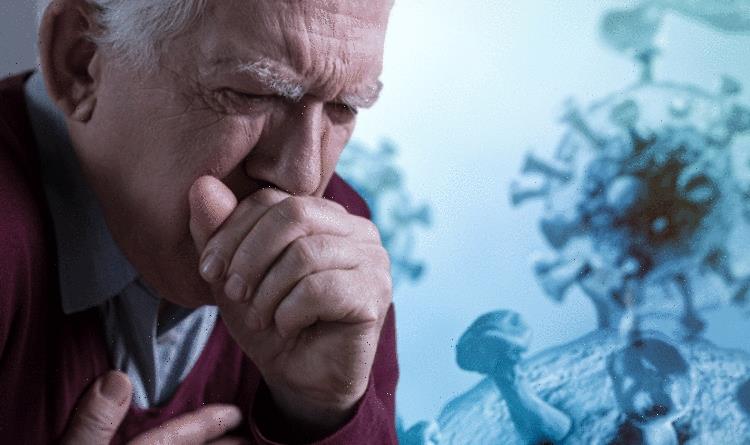Covid: New study compares Omicron symptoms to previous Delta variant as cases rocket
Omicron sub-variant discussed by infectious disease expert
We use your sign-up to provide content in ways you’ve consented to and to improve our understanding of you. This may include adverts from us and 3rd parties based on our understanding. You can unsubscribe at any time. More info
Covid is running amok in England, with record numbers of cases being recorded. Experts are attributing the current wave to two variants of Omicron – BA.1 and BA.2, which caused twin peaks in the pandemic, one in January and another last month, according to data from Imperial College London’s latest React-1 study. Although the situation is concerning, a new study suggests there are grounds for cautious optimism.
The research, to be presented at the European Congress of Clinical Microbiology & Infectious Diseases (ECCMID) this month in Lisbon, indicates people are less likely to be admitted to hospital with the current Omicron variant and that symptoms do not last as long in those who have been vaccinated than with Delta (6.87 days versus 8.89 days).
The Delta variant was the dominant variant in the UK until December last year, when it was superseded by Omicron.
The findings support previous studies that suggest the incubation time and period of infectiousness for Omicron is shorter than for previous coronavirus variants.
People who have Omicron are more likely to have a sore throat and less likely to lose their smell compared to Delta, a new study has found.

According to the research, the biggest difference was in the loss of sense of smell, which appeared in 52.7 percent of Delta cases, and showed up in less than 20 percent of Omicron cases.
The two COVID-19 symptoms that were consistently more prevalent in both variants – regardless of vaccination status – were a sore throat and hoarse voice.
Researchers also found that some of the more debilitating symptoms, such as brain fog, eye burning, dizziness, fever and headaches were significantly less prevalent in Omicron cases.
Researchers from King’s College London and scientists from Zoe studied the symptoms of 62,002 vaccinated UK participants from the Zoe Covid Study App who tested positive between June 1 last year and November 27 2021, when Delta was dominant, and December 22 2021 to January 17 this year when Omicron was dominant.
DON’T MISS
Statins: ‘High’ alcohol intake linked to greater risk of muscle toxicity [ADVICE]
Heart disease: People with deep wrinkles on forehead at risk [TIPS]
Long Covid: Sicca syndrome affects borth the eyes and mouth [INSIGHT]
Doctor Cristina Menni from King’s College London said: “We observe a different clinical presentation of symptoms in those infected with Omicron compared to Delta.
“As we are moving even further away from the average patient having UK government ‘core’ symptoms ie fever, persistent cough, loss of smell, our results point to a different selection of symptoms that may indicate infection.
“To protect others, it is still important to self-isolate for five days as soon as you see any symptoms.”
Professor Ana Valdes, an honorary professor at King’s College London, said: “Although there is still a wide range of duration and severity of symptoms with Omicron, for vaccinated individuals we find on average a shorter duration of symptoms.

“This suggests that the incubation time and period of infectiousness for Omicron may also be shorter.”
Symptoms to spot
The finding comes as the NHS added nine new symptoms of Covid to its official list.
The health body originally said a high temperature or shivering (chills), a new, continuous cough and a loss or change to your sense of smell or taste were the main signs of Covid.
It now includes the following:
- Shortness of breath
- Feeling tired or exhausted
- An aching body
- A headache
- A sore throat
- A blocked or runny nose
- Loss of appetite
- Diarrhoea
- Feeling sick or being sick.

“The symptoms are very similar to symptoms of other illnesses, such as colds and flu,” explains the NHS.
How to respond to symptoms
The NHS says you should try to stay at home and avoid contact with other people if you have symptoms of COVID-19 and either:
- You have a high temperature
- You do not feel well enough to go to work or do your normal activities.
“Take extra care to avoid close contact with anyone who is at higher risk of getting seriously ill from COVID-19,” advises the health body.
It adds: “You can go back to your normal activities when you feel better or do not have a high temperature.”
Source: Read Full Article
